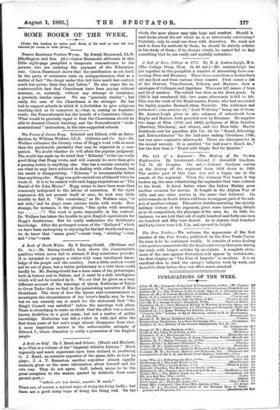The Poems of James Hogg. Selected and Edited, with an
Intro- duction, by William Wallace, LL.D. (Isbister and Co. 50.)—Dr. Wallace estimates the literary value of Hogg's work with no more than the pardonable partiality that may be expected in a com- patriot. We doubt whether he will affect the popular judgment. The world has made up its mind that "Kilnieny "is the one really good thing that Hogg wrote, and will scarcely do more than give a passing notice to anything else. One has a certain curiosity to see what he may have achieved in dealing with other themes, but the result is disappointing. " Kilmeny " is incomparably better than anything else. Hogg was quite carried out of himself when he wrote it. It is to be ranked with such happy inspirations as "The Burial of Sir John Moore." Hogg seems to have been more than commonly indisposed to the labour of correction. If the right expression did not present itself at once, he took very little trouble to find it. "His vocabulary," as Dr. Wallace says, "is not rich," and he plays some curious tricks with words. How strange, for instance, is the phrase, "She spoke with meaning leer "1 The word is quite impossible in the context. Dr. Wallace has taken the trouble to give English equivalents for Hogg's Scotticisms. But he really underrates the Southron's knowledge. After the prolonged course of the " Kailyard" which we have been undergoing or enjoying for the last decade and more, we do know that "maun greet"=must weep, " shieling"-=hut, and "e'en "-=eyes.






































 Previous page
Previous page